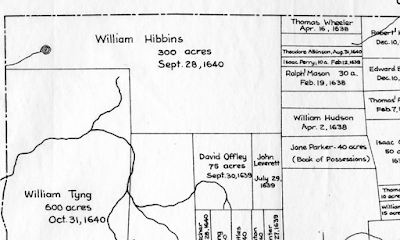Surprisingly, more than one hundred people were accused of witchcraft in New England before the Salem witch trials ever happened. Many of these accusations were made informally, but many made it all the way to the court system. That's quite a few accusations considering New England was only settled in the early 1600s. Shockingly, fifteen people were executed for witchcraft in New England between 1648 and 1692.
One of those executed was Ann Hibbins of Boston. If you've read Nathaniel Hawthorne's novel The Scarlet Letter you may remember Ann Hibbins. Hawthorne portrays her as an aged but wealthy woman who has sold her soul to the Devil. She futilely encourages heroine Hester Prynne to join her in the woods for the witches Sabbath, and even suggests that minister Arthur Dimmesdale might like an introduction to Satan:
“So, reverend Sir, you have made a visit into the forest,” observed the witch-lady, nodding her high head-dress at him. “The next time, I pray you to allow me only a fair warning, and I shall be proud to bear you company. Without taking overmuch upon myself, my good word will go far towards gaining any strange gentleman a fair reception from yonder potentate you wot of!”
Hawthorne is having a little authorial fun here with a historical figure. In his novel Ann Hibbins is an actual witch practicing dark magic, but he uses her mainly as a contrast to the fictional Hester Prynne, who although adulterous is not evil. When The Scarlet Letter was made into a Demi Moore movie in 1996 the screenwriter took even more liberties with the character: she was portrayed as a goddess-worshipping Wiccan.
 |
| Joan Plowright as Mistress Hibbins in The Scarlet Letter |
Not everything was perfect in the New World. They had some financial problems in Boston, including losing a significant amount of gold in a trade deal that went bad. Still, the Hibbinses were wealthier than most Bostonians, and William was even allotted three hundred acres of land in the Boston village called Muddy River (now the town of Brookline). Known as Stanford Farm, it was one of the largest allotments in the village. William also acquired several other pieces of land in Muddy River.
 |
| Map from Brookline Historical Society. |
Ann's behavior was considered inappropriate for someone of her status, and particularly for a member of the prestigious First Church. The church's leaders felt she should have behaved more moderately. They also thought she was being disobedient to her husband. After several hearings with Ann (who remained unrepentant) the First Church excommunicated her. This was a very strong rebuke, particularly since Boston was practically a Puritan theocracy at the time.
William remained a member of First Church, though, and his influence was able to protect Ann from any further repercussions. But when he died in 1654 Ann suddenly found herself in a vulnerable position, and in 1655 she was brought to trial for witchcraft. Interestingly, historians have not found any of the testimony given against her. We don't really know the specifics of the accusations against her, but they probably didn't really matter for the trial's outcome. She was an unpopular older woman with a bad reputation. The jury found her guilty and condemned her to death.
The verdict was refused by the colony's magistrates, and the case was sent to the General Court itself, the ruling body that William had served on. Surprisingly the General Court also found her guilty and sentenced her to die by hanging. It has been speculated that they returned the guilty verdict to defuse public outrage. She was executed on June 19, 1656.
Although she was unpopular and cantankerous, it seems that many people at the time felt her execution was unjust. For example, the Reverend William Hubbard wrote in the 1670s that:
Vox populi went sore against her, and was the chiefest part of the evidence against her, as some thought.... Many times persons of hard favor and turbulent passions are apt to be condemned by the common people for witches, upon very slight grounds.Stories about witches are scary. Accounts of demons, black magic and Sabbaths in the woods are good spooky stories to tell at night. But I think historical accounts of witch-hunts are even scarier, particularly in the clear light of day.

4 comments:
I appreciate you sharing your research, story publicly. My 8th gr. grandmother, Margaret Skillings, her daughter, my 7th gr. grandmother, Mary Prince and my 7th gr.Aunt, all from Gloucester, Massachusetts were also accused of witchery. They were jailed in Ipswich for several months and finally released without going to trial...all for gossips. Poor Abigail was only an early teenager...arrested after her mother, grandmother had all ready been jailed. I can't imagine being ripped away from my home, put in a cart and traveling dirt roads from Gloucester to Ipswich alone, no one to comfort you with the fear of death upon you. It was a cruel time, a very restrictive lifestyle for all during that time.
Thank you for the comment Denise! That's a very interesting story about your ancestors. I enjoy reading about old New England but would definitely not want to live during that time.
Thanks for the post, Peter! When I read tales of these witch hunts I always think about how many more injustices were carried out that never made the history books.
If people are truly interested in witch hunts, they should look to modern day Africa, where they are wide spread, on-going, and absolutely dwarf the entirety of Europe's And America's witch hunt craze.
And for all of those who presume innocence or guilt, while you're looking into witch hunts in Africa also look into ritual murders. Not all witches are over-sexed college girls looking to flip off their church-going parents.
Post a Comment